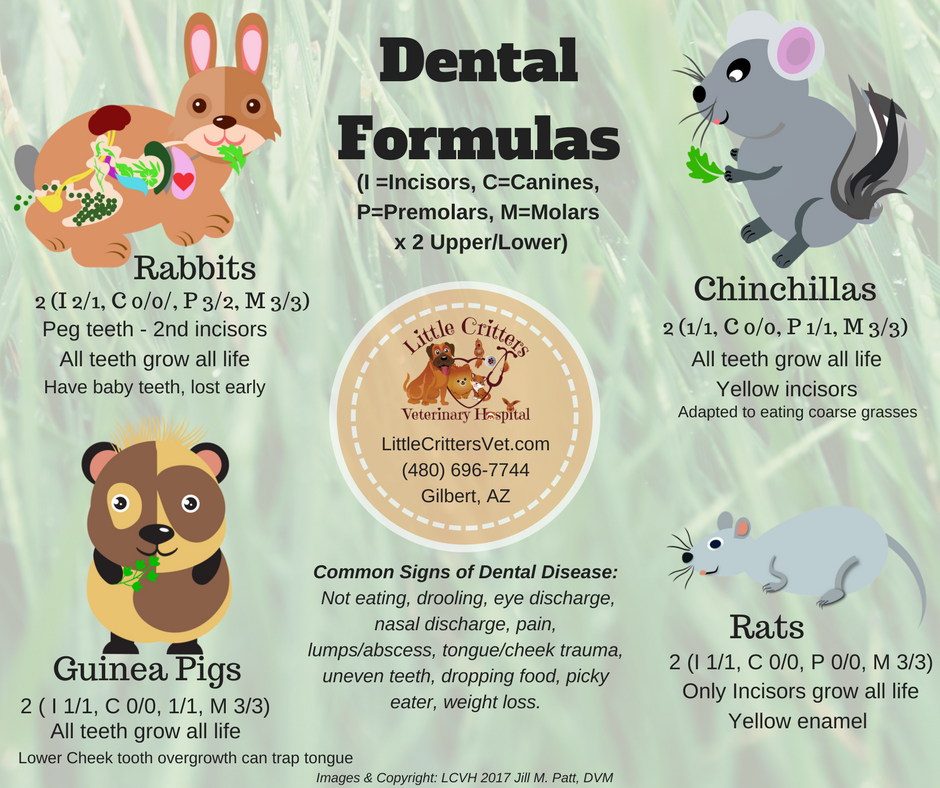|
CHINCHILLAS:
ABOUT: Chinchillas are South American rodents that can make excellent pets. They are long lived, with an average of a 15+ year lifespan. I often recommend chinchillas for those people considering purchasing an exotic pet. They are typically very gentle and become very tame when handled on a regular basis. Chinchillas come in a variety of beautiful colors, have a soft luxurious coat, are relatively quiet and, unlike small mammals such as ferrets, they have no real body odor. When well cared for they are healthy and unlike the other more common pet rodents, chinchillas are likely to be around much longer as they typically have a long life span.
DIET: Chinchillas have a sensitive gastrointestinal tract and should be given a routine diet that doesn’t vary on a daily basis. I recommend feeding them a mixture of chinchilla pellets, grass hay and some alfalfa hay for additional calcium.
SUPPLEMENTS? We know that guinea pigs are unable to make their own internal (intrinsic) vitamin C and will get scurvy without daily supplementation. However, it remains undetermined as to weather or not chinchillas can make their own vitamin C. The safest course of action is to supplement their diet with a chewable (XtraC from oxbow is a good choice) vitamin C tablet of about 100-200mg/day. A calcium supplement may also be needed if the diet is low in calcium or for pregnancy.
HOUSING: A flat bottom cage is safest for their toes and feet but will require much more diligent cleaning. Wood shaving are not recommended for rodents and the best choice for bedding is hay or recycled newspaper pellets. The cage should be the largest that you have room for and the use of a multiple level cage will increase their area of activity. Chinchillas are very active animals and are most active at night. They should be provided with monitored time out of the cage daily to allow them to run and play. A chinchilla wheel should always be available in the cage. A typical rabbit water bottle and food bowl should also be provided. Also, a hide box should be provided to allow them a feeling of security and a means of escaping if startled or stressed.
DUSTING: All chinchillas should be allowed access to a dust bath on a regular basis. Special chinchilla dust can be purchased at most pet shops and should be provided daily in a container. Common containers are litter boxes (covered work well) and large mouthed class jars big enough for the chinchillas to freely move around in. The container should be removed after the bath. Chinchillas have a very thick coat that does not dry quickly when wet. Dusting is their way of having a water free bath. Dusting allows them to remove oil and debris from their coats and truly seems to be a source of enjoyment
CHEWING: Like other rodent teeth, chinchilla teeth continue to grow throughout their lives. Normal healthy chinchillas should have yellow incisors. White incisors are often a non-specific sign of illness. All chinchillas must be given appropriate items to chew on throughout the day. Hay provides a good source of nutrition as well as fiber for chewing. They should also be provided with wood chew toys and pumice stones made for chinchillas. Always monitor chinchillas when allowed play time out of the cage because they will chew on just about anything.
SELECTED PROBLEMS
- Heat: Chinchillas are from high mountainous areas and are well outfitted for cold weather. As a result of their thick coat chinchillas over heat quickly and should always be housed indoors with an air conditioner. If overheated they should be quickly transported to a veterinarian.
- Eyes: They can suffer eye infections and irritations from dust and debris. Any chinchilla with tearing, redness, or squinting should be examined by a veterinarian.
- Teeth: Like guinea pigs, chinchillas can suffer from many dental problems such as overgrown molars and abscessed teeth. Common signs of dental disease are wet chin fur, weight loss, dropping food and avoiding hard foods. Part of a chinchilla’s annual veterinary exam is a through dental exam.
- Fur: If grabbed suddenly or inappropriately the fur will literally come off in clumps leaving patches of alopecia. Always handle a chinchilla gently and never grab the fur. Ringworm and mites can also result in hair loss and itchy skin. During the annual examination your veterinarian will ensure that your chinchilla has a healthy coat and skin.
- Grooming: Chinchillas will shed and ingest hair when grooming. They should be groomed on a regular basis to remove loose hairs. Intact males used for breeding can develop hair rings around the penile area that can cause constrictions and they should be carefully checked for these.
- Aggression with cage mates: As I’ve said, chinchillas are commonly very gentle animals but sometimes will become aggressive bullies when the same sexes are housed together. It is best to have only a single chinchilla or a male and female.
- Respiratory: Chinchillas can develop pneumonia from a variety of bacterial pathogens and any chinchilla showing increased respiratory effort, nasal discharge and/or weight loss should be examined by a veterinarian.
- Surgery: I don’t recommend spaying female chinchillas, but male chinchillas housed with females should be neutered to prevent disease and pregnancies. For more information on neutering see the ChinCare page which is linked below.

|